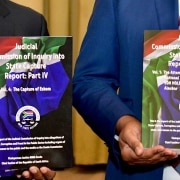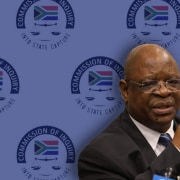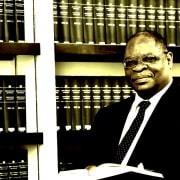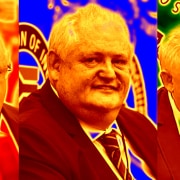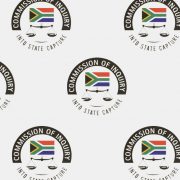|
Getting your Trinity Audio player ready...
|
This is the first of two articles that look back at the year that was for the commission of inquiry into state capture, which closed public hearings for 2020 on Friday 11 December.
The year of the new normal had as much impact on the state capture inquiry as it did on everything else. From an unscheduled long break in hearings, to witness no-shows and delays, calls for recusal against a “biased” Deputy Chief Justice (DCJ) Raymond Zondo, to media exposés and very public high profile arrests.
The theatrical exploits of legal professionals before the commission have also made it a wonder to watch, regardless of where on the political side of the coin you fall.
Zondo ended the year on Friday with the testimony of erstwhile Eskom acting CEO Matshela Koko, who enumerated, as had several other implicated witnesses, the faults of his investigation team in uncovering evidence. Koko called it an agenda of following the people, and not the evidence. This was during one of the evening sessions that became the norm over the past six months or so, owing to the desperate need to catch up on lost time.
In a short announcement, that was it for the year for the commission’s team, the media crews who gave us live pictures of the hearings, and the public – many of whom have adopted an edge-of-the-seat relationship with the commission, particularly this year.
The DCJ does not speak to the media much, at least not about his commission work, so when he does speak, he is taken seriously. He speaks with a sense of authority and clear purpose, but for the most part he isn’t asked tough questions about the shortcomings that have bedevilled his commission since its launch in March 2018. The inquiry is on its fourth secretary since it started, and there has been a noticeable change in evidence leaders, but there’s been little explanation for both developments.
Zondo’s last media briefing was on 3 June, where he announced several operational and strategic changes to the public hearings. His focus was going to be on “public protector issues”, allegations made and recorded in the report of Thuli Madonsela that necessitated the establishment of the commission.
Furthermore, to make up for time lost during the hard Covid-19 lockdown from March to June, evidence leaders were to zoom in only on matters that were relevant in witness affidavits, and leave out unnecessary information. There would also be evening sessions where necessary, for catching up – given that, at the time, the position was that hearings would be wrapped up in December. This, Zondo said, would give his team time in the first three months of the new year to write the report by the set deadline of March.
Zondo made an important announcement on that day – which would later turn the proverbial tables around – that former president Jacob Zuma was among the first few witnesses lined up at the resumption of hearings at the end of June. Not only has Zuma not given a word of evidence since, but the only appearance he made in November was to apply for Zondo to recuse himself. With the whole country’s eyes on him, Zondo dismissed the application three days later, leading to a much publicised walkout by the former statesman and his legal team. As a result Zondo laid a criminal complaint against Zuma for violating a summons that compelled him to stay, regardless of the dismissal of his application.
Meanwhile, Zuma’s lawyers announced that Zondo could expect a complaint against him before the Judicial Service Commission (JSC). Zondo has since approached the Constitutional Court to apply for an order compelling Zuma to not only return before him, but to stay for the duration of his evidence. Zuma missed the deadline to counter the application, and had not filed his JSC complaint at the time of writing this article.
Back to the hearings. The second half of this year has seen the most dramatic upsurge in interest since the Angelo Agrizzi spectacle of January 2019. Notably so, because a lot of the people who have been implicated over the course of the two years of the commission were compelled to appear by way of subpoenas. From Agrizzi’s testimony of last year, former cabinet minister Nomvula Mokonyane and former and current MPs Vincent Smith and Cedric Frolick respectively, have had to defend themselves against allegations that they received benefits from Agrizzi’s former employer Bosasa in return for their influence in the company’s government business.
Smith has since been arraigned on corruption charges linked to what Agrizzi termed the funding of his daughter’s university studies overseas. Smith maintained before Zondo, however, that a loan agreement between himself and Agrizzi enabled him to pay for the tuition. Bosasa, he said, was not part of the agreement.
Mokonyane also denied allegations that she received monthly cash bribes in return for her influence in the ANC to keep Bosasa’s irregular government contracts in place and to keep authorities at bay. A trending topic in respect of Mokonyane’s evidence was the 50th birthday party that Agrizzi claimed was thrown for her by Bosasa. She denied this fervently, saying that the only event ever hosted in her honour at the venue in question, the Victoria Guesthouse in Krugersdorp, was a surprise dinner for her 40th birthday, in 2003. The owner of the guest house, Frederik Coetzee, said Mokonyane’s party – which ended up with more guests than Bosasa asked him to prepare for – cost over R80 000, and the company paid the bill.
Former SAA board members Dudu Myeni and Yakhe Kwinana also appeared to answer to previous evidence. The two were accused of bullying staff into making decisions that favoured them, while also interfering in procurement processes. Unlike Kwinana who defended herself, Myeni invoked a privilege in the commission’s rules that she may avoid incriminating herself by not answering certain questions put to her. The result was three days of testimony where Myeni occasionally answered the questions – one answer would later lead to Zondo laying a criminal complaint against her. This was in relation to the part of her evidence that responded to allegations made by protected witness “Mr X” who placed Myeni in a money laundering scheme in the time that she chaired the Mhlathuze Water Board. Myeni told the commission that Mr X is known to her, and proceeded to name him, despite being forewarned not to.
Kwinana on the other hand, was accused by evidence leader Advocate Kate Hofmeyr of concocting new evidence in an effort to conceal the payment and use of an alleged bribe from a company called JM Aviation, which was supposedly imposed on major suppliers as a BEE partner. The R4.3-million bribe, argued Hofmeyr, partly paid towards the purchase of a property in 2016 for SAA Technical’s (SAAT) then head of procurement Nontsasa Memela. Between the two of them, Hofmeyr said, Kwinana and Memela tried to sell Zondo the story of an Eastern Cape property deal gone wrong between them, but that was only to cover up what really happened. JM Aviation is recorded as having paid R2.8-million in the purchase of Memela’s home.
JM Aviation director Vuyo Ndzeku, who is believed to have conducted several transactions under the scope of the commission, has denied any irregularities in the relationship between SAAT and his company. Like Memela and Kwinana, he has also denied that Memela’s home was paid for with kickback cash.
Look out for part two of this important summary

